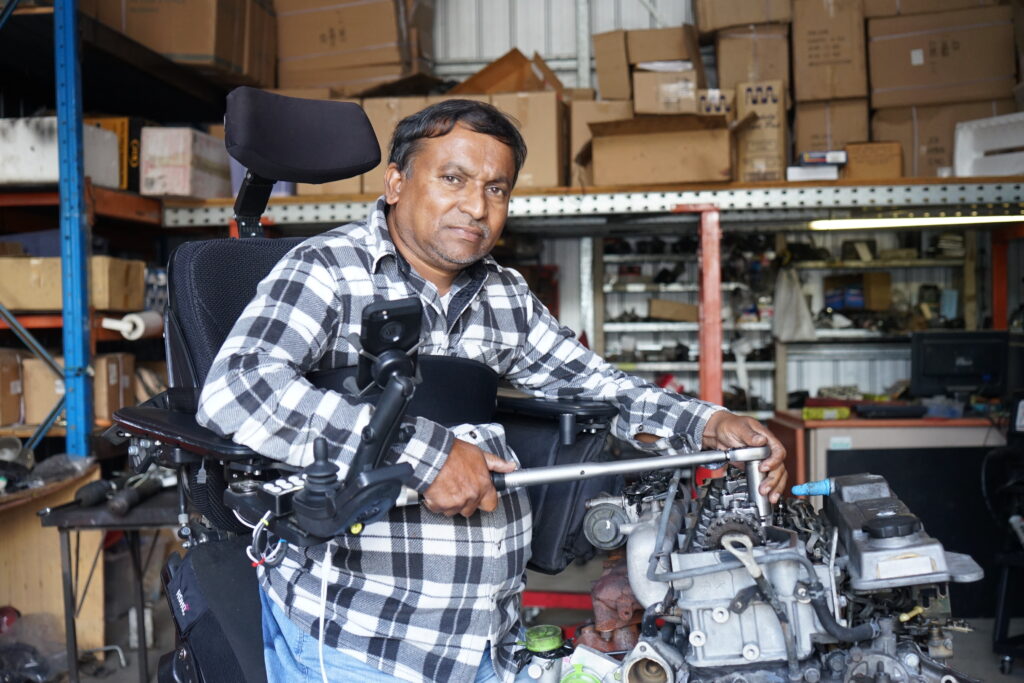Career pathways
Getting back to work is a vital part of returning to a ‘new normal’ following spinal cord damage. Research shows that people who return to work in a timely, safe, and sustainable way after a serious injury experience financial, social, psychological, and physical benefits.
Work provides us with a sense of purpose. It widens your social circle, improves your mental health, and, of course, provides income.
When should I go back to work?
The best place to start is by getting the OK from your GP or specialist for any required medical clearances. You may not have all the answers to begin with, but consulting with your medical professionals is a great way to kick things off.
Then, it’s important to consider everything that comes with the role, such as transport to and from your workplace, any assistive technology you may need to perform your role, personal support you may need in the workplace, and pain management considerations.
Returning to your previous role
If you’re thinking about returning to your previous job, it’s best to keep in touch with your employer during your rehabilitation and negotiate how and when you come back to work. This can include creating a gradual return-to-work plan, changing your duties to be more suitable, and tackling any accessible or assistive technology needs.
As an example, your bowel routine may prevent you from starting work until after 9am and that is something you can discuss and negotiate as part of your return to work.
Open and honest communication with your employer is key as they’re adjusting as well.
It’s important to remember this may be a learning curve for both you and your employer. You need to allow time to adapt to working life again, and potentially find new ways of doing certain tasks.
Trying something new
If you’re not quite ready, or can’t return to a previous role for one reason or another, there are lots of other options to explore – study, volunteering, or potentially a whole other career!
Our advice is find a job or career path that suits you.
Ask yourself:
- What are my interests?
- What are my key skills?
- What are my goals?
- What are my physical abilities and what fits with my lifestyle and locality?
- What is my motivation to work?
Volunteering is a great way to test the waters of a new career path and it will help you discover if a particular industry suits you. Plus it can provide excellent ideas of new jobs and industries. Volunteering Queensland is a great place to start.
If study is on the cards, most universities and TAFEs have information on their websites about accessibility and don’t be afraid to look into scholarships either. For example, TAFE Queensland offer Access and Equity Scholarships.
Most tertiary institutions have a Disability Support Officer on campus for students who can help you with any accessibility questions.
Whatever path you take, just make sure it’s sustainable and you look after yourself.
What returning back to work looks like
Keena’s return back to teaching
From her early days of working in after-school care when she was still a student herself, Brisbane member Keena Fox knew she wanted to become a teacher.
I was determined to get back to work after my injury but also anxious – what if it didn’t work out? What if my injury meant I could no longer do my job?” Keena said.
After a long recovery process and 15 months off work, Keena is back teaching primary school students with a little help from the Spinal Life Australia Back2Work program.
“I love what I do – it’s such a rewarding job and I love celebrating the successes of my students, no matter how small!”

Gamini’s journey back to diesel fitting
Before he sustained a spinal cord injury, member Gamini Samarakoon spent seven days a week in his workshop, working around the clock as a diesel fitter. After his injury, Gamini now spends seven days a week in his workshop, working around the clock as a diesel fitter.
With help from the Spinal Life Australia Back2Work program, and his new Permobil F5 wheelchair, Gamini has been able to continue his parts sourcing and vehicle repair business at his self-built workshop on his Morayfield property.
“The chair has been a life saver – I can still do nearly everything I did before my injury, and it’s all because I can stand up in my chair,” Gamini said.
Gamini is one of Australia’s top importers of parts for the Mitsubishi Delica, a Japanese-based range of vans and pickup trucks.

Not sure where to start?
Contact our enquires team to access more information.

